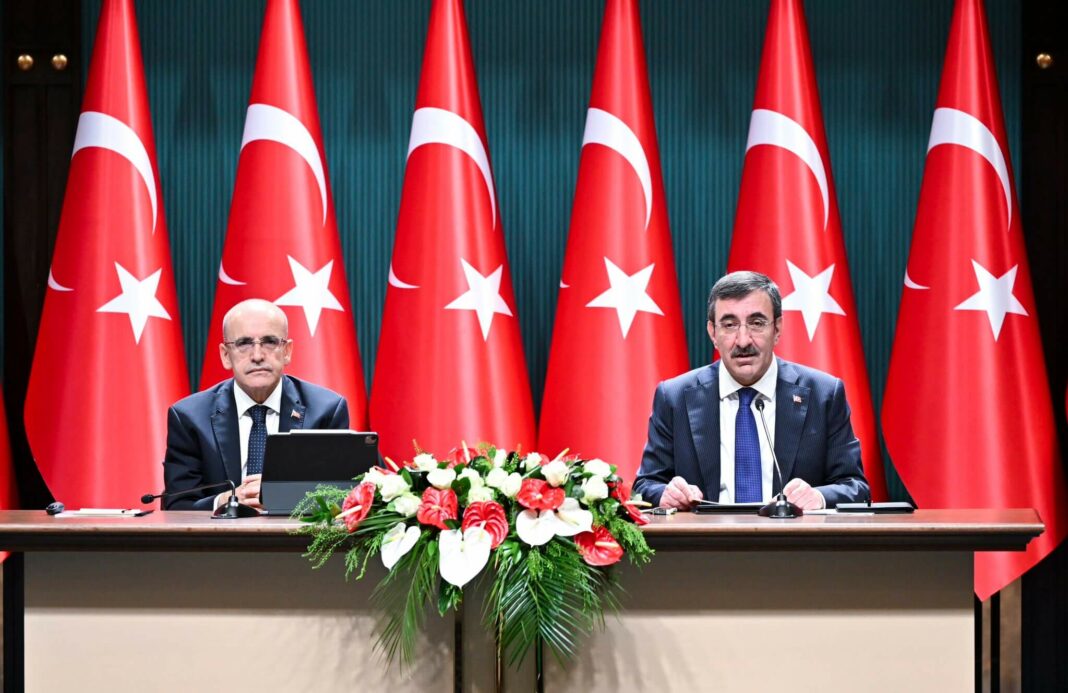Turkey on Monday announced a three-year austerity plan aimed at reducing public spending in order to calm inflation, which reached nearly 70 percent year-on-year in April, Agence France-Presse and the state-run Anadolu news agency reported.
The “Savings and Efficiency Package in the Public Sector” measures were unveiled by Vice President Cevdet Yılmaz and Finance Minister Mehmet Şimşek at a news conference at the presidential palace in Ankara on Monday.
According to the package, public institutions’ new purchase or rental of vehicles, furniture and office equipment as well their purchase or construction of new buildings would be paused for three years except for “mandatory requirements” concerning the health, security and defense sectors.
There will be a 25 percent cut in the funds allocated to state agencies for promotion and representation expenditures for the year 2024. Additionally, restrictions will be imposed on promotional and representational activities overseas.
An upper limit will be imposed on the salaries of public servants when they also serve as0 executive board members of state-run companies.
The ruling Justice and Development Party (AKP) attracts frequent criticism due to bureaucrats and AKP advisors collecting multiple salaries.
The last time the AKP government announced measures aimed at reducing public spending was in June 2021.
Yılmaz said the aim of the measures is to recover from the effects of two major earthquakes that hit Turkey last year, claiming more than 53,000 lives and causing massive devastation, in addition to fight against high inflation, which he said has been a problem around the world following the coronavirus pandemic.
Turkish government officials tend to explain the country’s high inflation rate with external factors or present it as a worldwide problem. But economy experts say President Recep Tayyip Erdoğan’s unorthodox economic policies «keeping «interest rates low played a significant role in the economic deterioration.
“Our priority is to combat the high cost of living. Low, single-digit inflation is essential for sustainable growth,” Şimşek said during the presentation of the economic plan.
The plan includes numerous budget cuts “for the entire public service” some of which will require legislation to be submitted to parliament, the minister said.
The use of imported vehicles will also cease within the public service, the minister said.
The construction or purchase of public buildings is also suspended for three years, except for those built to reduce earthquake risks or those affected by natural disasters.
Other budget cuts are also planned to “discipline spending,” such as a 10 percent reduction in public budgets for the purchase of goods and services and a 15 percent cut in investments — with the exception of spending in regions affected by the two major earthquakes in 2023.
The minister did not specify the government’s policies on salaries, but the number of recruitments in the civil service will be limited to the number of retirements.
In mid-April Turkish Labor Minister Vedat Işıkhan announced a freeze of the minimum wage, which is usually raised in July.
The net minimum wage was increased by almost 50 percent on January 1 to 17,002 Turkish lira ($528).
Inflation reached 69.8 percent year-on-year in April — up from 68.5 percent in March, according to official data published in early May.
Last week Fatih Karahan, the governor of Turkey’s central bank, estimated that inflation would start slowing in June and raised the year-end inflation forecast to 38 percent, up from a previous estimate of 36 percent.
Şimşek forecast a return to single-digit inflation at the end of 2025.
The staggering rise of consumer prices and the depreciation of the Turkish lira against the US dollar and the euro are deemed responsible for the election defeats sustained by President Recep Tayyip Erdoğan and the AKP government in the March 31 local elections.
ENAG, a group of independent Turkish economists, estimated inflation at over 124 per cent year-on-year in April — up five points month-on-month.
President Erdoğan long blamed inflation on high interest rates, even though it is the conventional policy at central banks worldwide to raise borrowing costs in order to lower inflation.
But after securing victory in the May presidential election last year, he has returned to economic orthodoxy and put full confidence in his economic team led by Şimşek.
Erdoğan has allowed Turkey’s central bank to hike its main policy rate from just 8.5 percent before his re-election last May to 50 percent.
But the monetary authority lists other factors still feeding inflation, including a weak lira, a massive jump in the minimum wage in January and surging costs for food and fuel.



